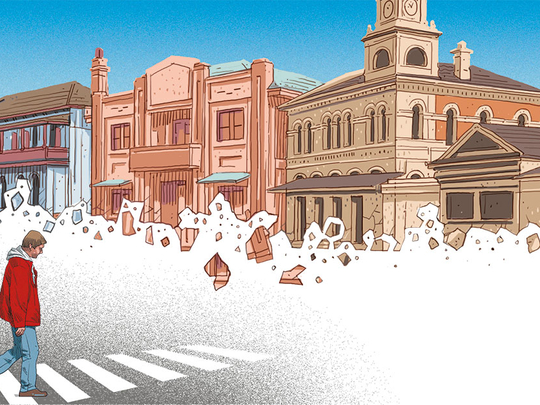
By Shaun Prescott, Faber & Faber, 256 pages, £9.99
The sense of some deeply melancholic encounter haunts the pages of Australian writer Shaun Prescott’s winningly glum debut novel, aided by elegiac musings on belonging and estrangement, growth and decay, places and voids, portals and dead-ends. An unnamed writer arrives in an unnamed town, rents a room, finds a congenial cafe and a tolerable pub, and starts to write a treatise on “the disappearing towns of the Central West of New South Wales”. Like much about this simultaneously realist and absurdist novel, that word “disappearing” hovers at the line between the figurative and the literal. Are these towns merely in decline or are they literally vanishing? Both, it would seem, and before long, circumstances suggest that the one the writer has settled in is itself disappearing. He adjusts his focus accordingly, chronicling the local process of entropy as it unfolds around him, in ways that range from the banal to the apocalyptic.
At the realist level, The Town scrupulously catalogues the physical desolation of places that have lost whatever purpose they once had but drift on out of habit, an enervating dreck of shopping plazas, petrol stations, ring roads, littered parks and fast food chains. And as the writer gets to know various individuals around town, so this desolation begins to acquire a human face.
Almost all these characters are studies in failure of one kind or another. There’s Tom, the ex-musician who drives the town bus on which nobody ever travels. There’s dim, truculent, small-minded Jenny, who runs the failing pub. There’s the xenophobic town bully, Steve Sanders, rumoured to be spoiling for a fight with the writer. There’s Rick, who seeks nothing loftier than a job at a supermarket but gradually surrenders to bong-induced lassitude. There are crowds of nameless teens and townsfolk who spend their days getting drunk and stoned and then brawling or vandalising the place.
The one possible exception to the general haplessness is Ciara, a DJ at the community radio station (which of course no one listens to), who at least has yearnings for a more vivid existence, and whose job opens up an interesting theme of music as a conduit to richer realities. She and the writer strike up an ambiguous friendship that provides some tension, though in keeping with the book’s fastidiously low-key affect, it doesn’t go anywhere decisive.
A gentle, deadpan comedy of listlessness prevails. Everything partakes in it. People get drunk till they reach a state of “aggressive sadness”. Houses are mysteriously abandoned. Businesses downsize and close. The town starts to resemble “a depressed country [music] festival suspended in a 2am lull”. The prose itself mimics the general sense of dwindled options: “Usually I ate boiled spiral pasta with grated zucchini and mushrooms. Sometimes I would also add cheese.”
Occasionally someone tries to leave, and it’s here that the book’s absurdist DNA starts to reveal itself. There’s a station, but trains no longer stop there, and most of the roads that ought to lead out in fact end in cul-de-sacs. A forbidding shimmer lurks on the horizon. Technically it’s still possible to drive off, so we’re not quite in the realm of The Prisoner or The Truman Show, but most attempts end in failure. The people making them are struck by terrible misfortunes or else, as in Sartre’s Huis Clos, they open the doors of their respective hells only to find they can’t summon the will to step out.
As the metaphysical weather darkens, so this state of inertia extends not only through space but also through time. The town may have seen better days, but suddenly no one can remember them — or indeed anything else about its history. The narrator realises that he, too, is beginning to forget where he came from: “I tried to trace the highways east and west of the town in my mind, but my memory faltered at the shimmer.” And not just the past but the future — all eternity — seems threatened by the encroaching paralysis. As Sanders, the bully, declares in a splendidly bizarre scene in which he materialises in quadruplicate: “This is how things are going to be from now on. This is how they’re going to stay. History can end, you know. It doesn’t have to keep going … ”
These tropes may not be entirely original, but they’re executed with a mixture of conviction and laconic humour that gives them a fresh appeal. At one point holes start appearing all over town, some small, some enormous. People, buildings, whole blocks disappear into their seemingly bottomless depths. The fabric of reality itself appears to be eroding, but the townsfolk carry on doggedly, remarking “It’s not your typical hole” or at best “It’s probably an environmental disaster”, while municipal workers put up tape and boards, and the police mount “infrequent” patrols around them. The muted reaction captures the diminished scope of the human imagination — its hopeless inadequacy in the face of imminent extinction — with painful wit.
Do these ideas catch fire, dramatically, in the way the best speculative fiction does? Perhaps not quite — the human element is a little thin, even allowing for the fact that the book is partly a portrayal of societal enfeeblement. But it’s an engaging, provoking novel nevertheless, intelligently alive to its own metaphorical possibilities, and leaving behind a powerful vision of the world ending, not with a bang, but a whimper.
–Guardian News & Media Ltd
James Lasdun’s latest novel is The Fall Guy (Vintage).









